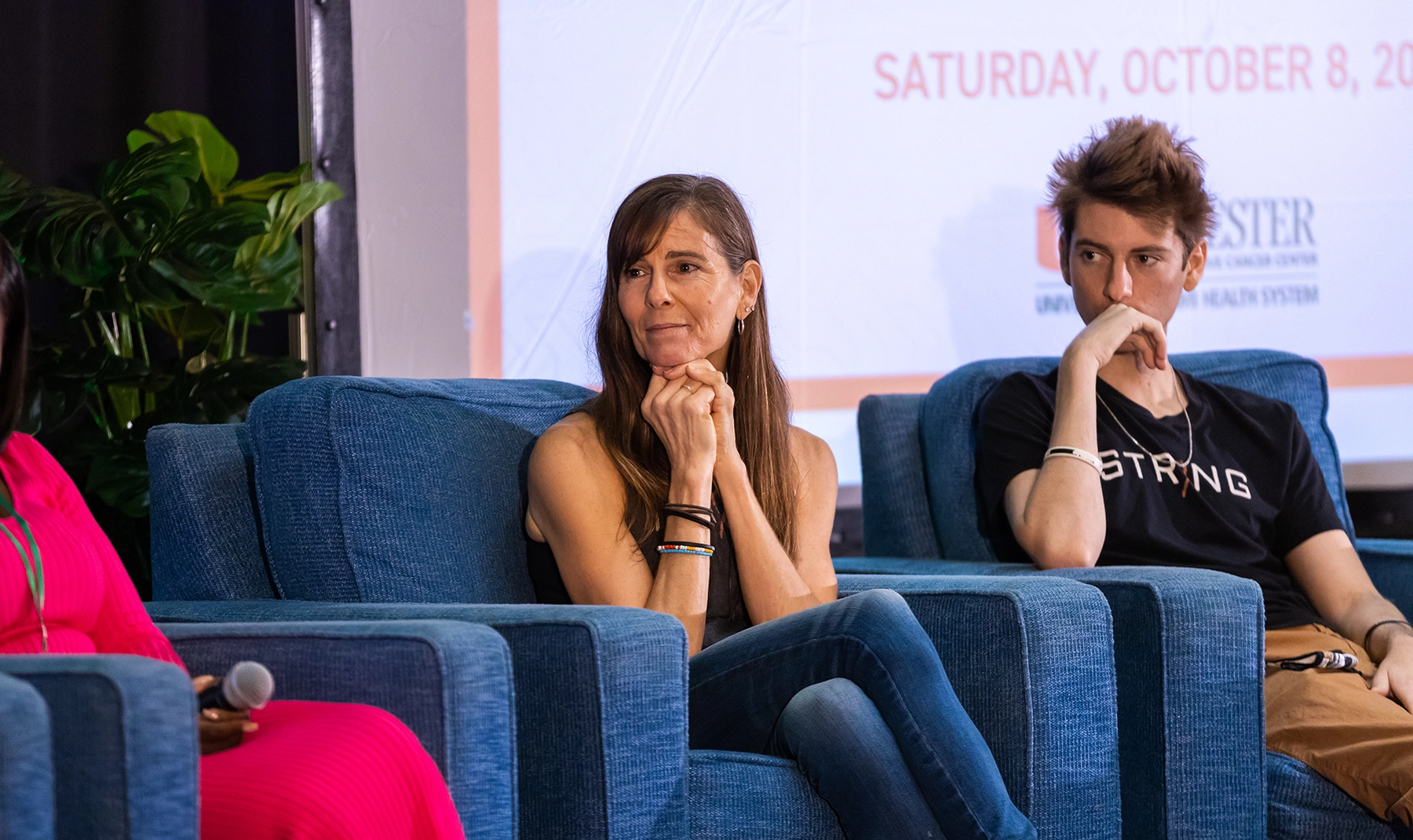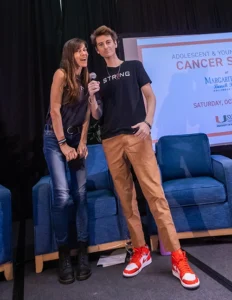Mom and Son Share Tips on Life After Cancer

Cancer at any age is difficult, but individuals ages 15 to 39 are balancing life’s challenges, like finishing school, having children, and maintaining relationships despite a cancer diagnosis. Sylvester Comprehensive Cancer Center supports cancer patients and their caretakers throughout survivorship, from diagnosis through treatment and beyond, while helping them navigate their life goals.
There’s no roadmap to follow after cancer treatment. The questions and uncertainty remain.

Ashlee Cramer has spent years supporting her loved ones through cancer treatment, first with her husband — who died of diffuse large B-cell lymphoma — and a few years later with her son, Michael.
Michael recently completed his cancer treatment plan for hepatosplenic T-cell lymphoma at Sylvester, but the pair still navigate treatment for graft-versus-host disease (GVHD). The grueling disease, which can be acute or chronic, is a common complication among bone marrow transplant (BMT) patients. Adapting to this new stage of Michael’s life has its challenges.
“On the oncology floor, you’re surrounded by other families enduring similar pains, emotionally and physically. You know you are not alone in going through it. It makes you appreciate there is a whole group of humans in this tiny circumference who you can relate to, who speak the same language,” says Ashlee.
The time for survivors and caregivers to reflect may not come until after cancer treatments are completed.
“In hectic moments, we have adrenaline, and our bodies and minds want to protect us. But when we finally have the downtime, it all comes rushing back,” says Ashlee.
The Cramers are members of the Patient and Family Advisory Council (PFAC) at Sylvester, a group that works to improve care and support families like theirs. Sylvester’s PFAC is the longest standing group and is one of many offered through the University of Miami Health System (UHealth). Ashlee is working with UHealth to create a PFAC for caregivers.
Both Ashlee and Michael see life after cancer as a second phase of a journey that’s not over. They take each day one moment at a time. Together, they summon grace and strength they never could have imagined before facing cancer.
Cancer survivorship is a journey, not a destination
Like the ancient Japanese art of Kintsugi, where broken shards are reassembled with gold filament to create an even more beautiful vessel, the Cramers have found beauty in the brokenness of their survivorship journey.
After a painful knee replacement surgery in January at Sylvester that resulted from GVHD complications, Ashlee wrote on her blog, “We keep hearing, now that the surgery is over, that knee replacements are up there with the most painful of recoveries. We agree. But then, as always, the beauty is there, too. The gold in the cracks.”
The Cramers have documented Michael’s months of cancer treatment and his months of treatment for GVHD on a blog, a podcast and on social media. Sharing their story with thousands of followers has been a creative outlet and a source of comfort.
The two dance, rap, write and appear on talk shows, lifting themselves by inspiring others. “It’s meaningful to find purpose in your struggles,” says Michael. “Everything I was going through wasn’t for nothing because I was inspiring people. I was helping people by working on something that distracted me from my pain.”
6 lessons for post-cancer treatment
Throughout Michael’s treatment, the Cramers have tried to find meaning in their difficult, painful journey. “This is not the club you want to be part of, but once you are in, it’s the most supportive, honest, humbling, real club ever,” says Ashlee.
Following are some lessons they’ve learned that they hope will inspire others.
Find a community of survivors
Both Michael and Ashlee are clearly extroverts, which allowed them to find a community of survivors through their content creation. The one-on-one connections they’ve made have been just as valuable. Michael, who is a member of Adolescent and Young Adult (AYA) PFAC at Sylvester, recommends every cancer survivor share their journey with at least one other person who has also survived cancer or join a support group. “Connection, being vulnerable, and sharing is so important in survivorship,” he says.
For AYA patients, this is especially important, says Michael. “Many times, you can’t relate to your old friends because they haven’t been through what you’ve been through. You’ve matured so much that you outgrow some old friends.”
Consider therapy
Therapy can be an important part of recovery for cancer survivors and their caretakers. Cancer survivors live with a lifetime of screenings and a fear of cancer’s return. Besides that, many experience post-traumatic stress disorder from medical trauma, survivor’s guilt and social anxiety. “We have a lot of emotional scars on the inside,” says Ashlee.
Find your purpose
Michael, who was once a competitive windsurfer, has had to find other hobbies and interests to enjoy. He continues to work out –– albeit with dramatically different fitness goals. He learned guitar, takes walks and spends time creating content on TikTok.
As a family, the Cramers share a digital gratitude journal over a family chat.
“Find something to keep you going and staying present. The little things just matter so much more,” says Ashlee.
You can’t be enlightened 24/7
When cancer changes your entire life perspective, you might expect to have evolved, says Ashlee. When she feels impatient in traffic or annoyed by bills, she reminds herself that she and her children woke up breathing that morning.
“We have been given the gift of so much insight, but we are still human.”
Survivor’s guilt is real
Ashlee and Michael both admit to feeling guilty when they think of those who lost their battles with cancer. Ashlee admits that life isn’t fair, so she tries to focus on acceptance.
“Acceptance doesn’t mean we think everything is perfect or just, but it means we can continue life and do our best to do our best,” she says.
Don’t compare yourself to peers
In many cases, cancer patients and their families build a community together throughout treatment. Leaving that bubble means seeing healthy people outside the hospital in a new light.
“Their bodies look so strong. We have to remind ourselves on a daily basis not to compare. Compare yourself to yourself. Remember where you have been and how far you have come,” says Ashlee.
As much as cancer has changed the Cramers’ lives, Ashlee and Michael focus on finding meaning in how they’ve evolved.
Ashlee says, “People say bounce back with the best intentions, but you don’t want to bounce back. You want to bounce forward because you’re not the same. You’ve changed.”
AYA and the Cancer Survivorship Program at Sylvester help patients navigate the long-term effects of cancer treatment. If you’re an AYA cancer or caretaker, please join Michael and Ashlee Cramer, who will be speaking at the AYA Summit at the Newman Alumni Center in Coral Gables, Fla., on April 13. The free patient education event includes a meet and greet, a resource fair with local and national organizations and breakout sessions. Click here to register.
Wendy Margolin is a contributor to UHealth’s news service.
Tags: Ashlee and Michael Cramer, cancer care in Miami, cancer survivor, lymphoma, Survivorship
